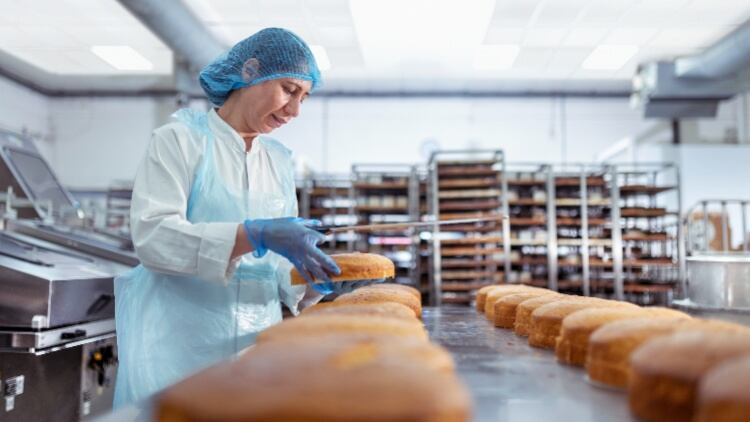Food businesses are becoming the “squeezed middle” between higher and volatile raw material costs and retailers' increasing pressure to keep a lid on prices, senior executives have warned.
Just under two-thirds of UK and global food business leaders said in a recent in-depth survey by supply chain consultancy EFFP that the inability to mitigate and recover rising costs was their biggest concern.
One industry insider respondent told EFFP that competitive pressures and shopper expectations meant that retailer “purchasing plans are now largely based on tender models, which has driven pricing down to dangerously low and unsustainable levels”.
For example, in sectors faced with existing slim margins, such as fresh produce, growers are being forced to evaluate ways to reduce their exposure or risk having to leave the sector entirely, the survey highlighted.
From just in time to just in case
After rising costs, senior food business leaders who took part in the EFFP survey identified supply chain disruption as the next most significant challenge for the coming year.
Food manufacturers said they increasingly have to focus on taking a “just in case” approach to their supply chains to protect themselves against disruption. This unravels many of the efficiencies the “just in time” model created in recent years.
Leaders also warned that rising levels of “political, climate or sanitary shocks” are creating additional supply chain volatility.
To adapt, food producers face the choice of investing in more resilient production methods or leaving themselves exposed to shoring up supply at short notice (and higher cost) or, worse, not being able to supply the produce at all.
Businesses can invest when margins are healthy, but if they’re not, as one survey participant said, “gaps appear on shelves”.
The causes of supply chain disruption are multifaceted, the survey revealed.
One respondent said a shortage of skilled labour “impacts supplier reliability, which can frustrate customers trying to navigate more volatility”.
Another said that food businesses’ move towards a “just in case” model is leading to “higher inventory levels” and subsequent rises in “costly working capital”.
Environmental and sustainability pressures remain , but financial constraints hinder action
Although less than a quarter of survey respondents included “environment and sustainability pressures” in their top two supply chain concerns, nearly 90 per cent had it in their top five, highlighting how sustainability is seen as important until short-term pressures bite.
Several respondents pointed out “a mismatch between environmental ambitions and real action being taken on the ground”. At the same time, recent prime minister statements over relaxing carbon-neutral targets have caused confusion about what the industry requires.
Despite Rishi Sunak’s comments, most said they are maintaining a focus on the 2050 regulatory timeline to net zero (or sooner). However, many admitted that “it will be challenging to hit 2030 and 2050 targets based on current progression”.
Others haven’t even begun to focus on sustainability in earnest. One food manufacturer declared that they weren’t “concerned at present [about the sustainability of their supply chain], but we will need to work on it over the next five years”, while another bluntly stated that “survival is the main focus”.
Many companies need help navigating the complexity of supply chains
A recent report by the environmental campaigning organisation WWF found that more than 70 per cent of food-related Green House Gas (GHG) emissions stem from agricultural practices (scope three emissions). As such, a critical step toward hitting sustainability targets is the ability to understand, measure and report on these impacts.
Food business leaders told EFFP’s survey that “supply chain due diligence laws [require]… considerable effort to get full visibility, as many supply chains in food processing are complex”.
Aside from supply chain transparency challenges, they said “it is resource intensive to collect and share information individually with different stakeholders (e.g., customers, investors, regulators) in the formats they want”.
Stakeholders differ in how they measure sustainability, but also often want similar information presented in different formats, survey respondents warned.
However, there is some good news on the horizon, as many told the survey they are hopeful that the EU Corporate Sustainability Reporting Directive (CSRD) will provide some degree of standardisation that will improve this situation.
However there is also a general nervousness about what regulation may come next.
One food business leader felt “confident we can provide answers [to scope three requests], [and believes] carbon emissions will be heavily influenced by the ability to reduce the reliance on diesel and nitrogen fertiliser”.
Others were not so clear due to “contradictory [messages] between financial and environmental challenges”, adding customers “want a low price above all”.
Finding a way forward
The overriding message from our survey is that food industry leaders have some confidence in their ability to deliver this year but know they need to make significant changes to ensure their supply chains are fit for the future.
While three-quarters of respondents said they were “somewhat confident” or “very confident” about the resilience of their supply chains over the next 12 months, more than half were not confident their supply chain relationships are where they need to be to build the resilience needed in the future.
In the year ahead, most said their teams will focus on longer-term strategic changes within their supply chains.
The question is, will those longer-term “strategic changes” lead to reduced production, more of the same, or a fundamental re-configuration of relationships along the supply chain?
Paradoxically, today’s cost pressures and supply chain disruptions are leading some food businesses to delay sustainability investments, which, in our view, creates a more fragile food system, reducing the capacity to adapt to shocks in the future.
Land that is farmed less sustainably is more prone to flooding, drought, and extremes of weather. Unhealthy soils are less able to deal with the impacts of climate change. If producers can’t make a sustainable profit, they will do something else (perhaps return the land to nature), and a higher proportion of our food will be dependent on longer and potentially even less resilient supply chains that UK buyers have little or no control over.
Although a critical step, measurement and regulatory compliance alone won’t improve supply chain sustainability or resilience. Many companies are overwhelmed as they see sustainability, supply chain disruptions, and rising costs as distinct, competing issues to be dealt with.
But it needn’t be so complicated. By aligning corporate strategy with procurement and sustainability goals, teams and supply chains can collaborate to find solutions that balance the needs of all.
With political, regulatory, financial and climate risks becoming more volatile and uncertain, the cost of inaction is becoming significantly higher than the cost of action. If supply chain teams don’t balance longer-term supply needs with short-term requirements today, the job will be much more challenging tomorrow.
We believe this survey underlines what we at EFFP already know – and passionately believe: Food companies must engage strategically with their supply chain partners to unlock synergies, reduce price volatility, and increase the security of supply to ensure not only their survival, but the future of healthy, resilient and reliable food systems overall.
Specialist agri-food supply chain consultancy EFFP has been helping global food businesses achieve this goal for the last 20 years. As a result of our work, our clients have increased the resilience, sustainability, and profitability of their supply chains.
The buyers of agricultural products have a choice – minimise costs and effort today or engage their supply chain partners to lay the foundations for a more sustainable, profitable, and resilient tomorrow.
What is your company doing to make your supply chain more resilient for the future?
In other news, Swedish investment firm Profura Group has announced the acquisition of plant-based drinks manufacturer Framptons.




